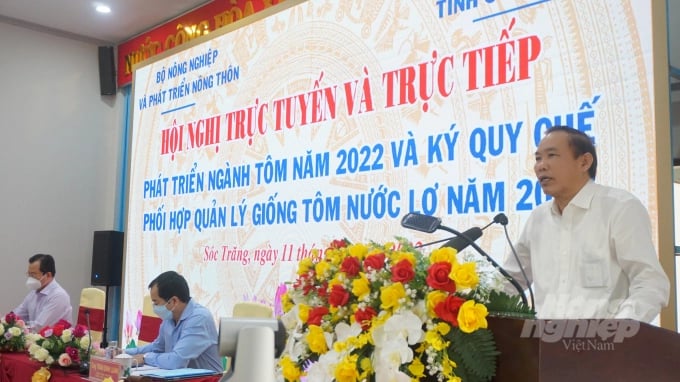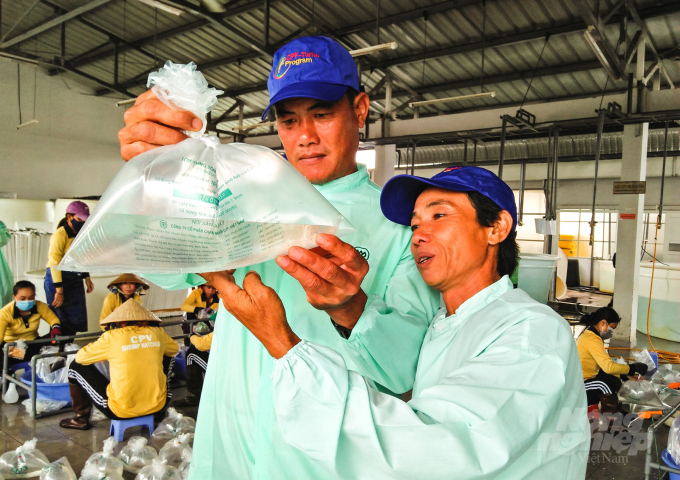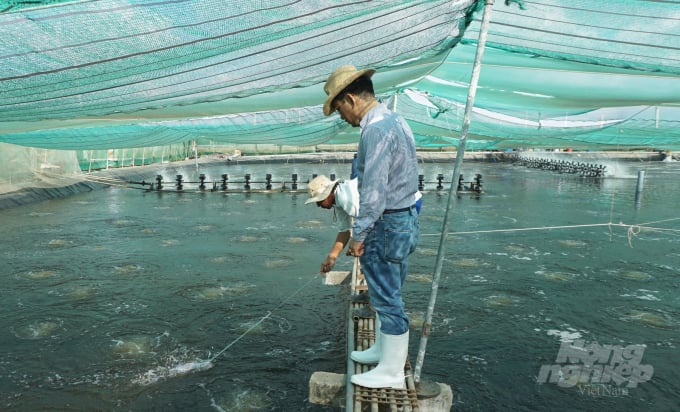June 21, 2025 | 02:43 GMT +7
June 21, 2025 | 02:43 GMT +7
Hotline: 0913.378.918
June 21, 2025 | 02:43 GMT +7
Hotline: 0913.378.918

Deputy Minister of Agriculture and Rural Development Phung Duc Tien spoke at the 2022 Shrimp Industry Development Conference in Soc Trang province. Photo: Huu Duc.
Over the years, Vietnam's shrimp industry has overcome many difficulties to achieve high growth. In most localities, brackish water shrimp farming has always faced problems due to the Covid-19 epidemic, especially those producing brackish water shrimps and breeding.
In addition, the situation of saline intrusion and successive natural disasters directly affected the South Central and Southern provinces, so shrimp farmers were severely affected.
In the 2022 shrimp crop, the shrimp industry aims to grow and export more than US$ 4 billion. The fisheries sector has developed projects to develop the shrimp industry. However, many problems still need to be resolved soon after many years to maintain the growth goal towards sustainable development.
The Mekong Delta has the largest concentrated shrimp farming area in the country's coastal region. Leading the way is Ca Mau province, with about 280,000 hectares, with many types of farming such as super-intensive, intensive, semi-intensive, extensive, and the largest shrimp-rice farming model in the region.
In 2021, despite many difficulties, the shrimp industry achieved good results. Shrimp production for the whole year reached 970,000 tonnes, up 4.3% compared to 2020, brackish water shrimp reached 920,000 tonnes. The country's shrimp export turnover reached US$ 3.9 billion, up 5.4% compared to 2020.
Mr. Le Van Su, Vice Chairman of Ca Mau province, said: Currently, there are many small shrimp farming areas. Irrigation infrastructure conditions in the farming area are not guaranteed. The quality of shrimp breed needs to have a stricter coordination regulation to eliminate the poor quality shrimp breed causing damage to farmers…
Therefore, Ca Mau province proposed the Ministry of Agriculture and Rural Development to have a separate scheme and project for regions with shrimp-rice areas in the Mekong Delta to review the difficulties in the past time to orient long-term development.

Shrimp farmers choose to buy disease-free shrimp Breeds and reputable brands. Photo: Huu Duc.
Soc Trang is an intensive and semi-intensive brackish water shrimp farming area of 53,000 hectares. Many shrimp farms apply high technology, accounting for 9%, increasing productivity and efficiency. The rate of shrimp farming losses decreased to 6%. The total farmed shrimp production in 2021 reached 189,000 tons. The export turnover of brackish water shrimp was over US$ 1 billion.
Determining shrimp farming is the economic strength of the province. However, Mr. Vuong Quoc Nam, Vice Chairman of the People's Committee of Soc Trang province, still has many worries: Irrigation infrastructure for the farming area is an important issue. Recently, the province has invested in ensuring the supply of clean water. Soc Trang province needs 20 billion breeds every year, but the supply in the province is still limited, so it is essential to ensure a good supply of shrimp breeds.
Through field surveys from shrimp farming areas in localities, up to now, there are still some difficulties and problems. That is the reality that most of the farming area's infrastructure is not guaranteed.
Regarding the demand for shrimp breed of the whole country is about 140-150 billion heads (In which 100 - 110 billion heads of white leg shrimp and 30-40 billion heads of black tiger shrimp). The number of shrimp parents needed to produce breeds is 250,000 heads.
The source of shrimp breed and parents depends mainly on imported sources. Meanwhile, exploiting shrimp from the wild in the country can only provide a part. However, the imported shrimp parent quantity is decreasing, with the participation of enterprises and the state increasing research resources for research institutes.
On the other hand, the cost of shrimp production in the country is still higher than that of other countries. The reason is that shrimp feed still accounts for a high proportion (about 65% of the cost of shrimp farming), the breed cost is high, accounting for about 10%...
Recently, in Soc Trang province, during the Conference to discuss solutions to develop the shrimp industry in 2022 and sign the regulation on coordination in the management of brackish water shrimp breeds in 2022, Deputy Minister of Agriculture and Rural Development Phung Duc Tien pointed out the reason: Despite facing many difficulties in 2021, shrimp production in 2021 reached and exceeded the planned target.

Enterprises investing in high-tech shrimp farming in Soc Trang province. Photo: Huu Duc.
However, the price of farmed shrimp in our country is still high. Infrastructure and irrigation in the farming area are not guaranteed. The area of extensive shrimp farming is still significant. However, shrimp farming technology, especially extensive shrimp farming, shrimp-rice... productivity is still low, efficiency is not high, and its potential and advantages have not been fully exploited.
It is necessary to change the appropriate farming model to limit risks and limit diseases. Leaders of specialized local fisheries agencies shared ideas that needed attention, focusing on discussing credit solutions for converting brackish water shrimp farming models.
Deputy Minister Phung Duc Tien emphasized: The potential of the shrimp industry is still tremendous. According to a forecast from the Vietnam Association of Seafood Exporters and Producers (VASEP), there are enormous opportunities for the shrimp industry, expected to increase by 57% in value in 2022 and output by 24%.
To solve this goal, the Ministry of Agriculture and Rural Development will synchronously direct the components to improve the competitiveness of the shrimp industry, both in value and output.
Firstly, the breeding stock must be strictly inspected and controlled, and the breed production capacity should be improved because varieties determine yield and quality.
The second is to find solutions for input materials to reduce feed costs. The third is to warn and treat diseases more effectively to improve the quality of farmed shrimp.
In addition, the Ministry of Agriculture and Rural Development will simultaneously connect markets to help Vietnamese shrimp diversify export markets and meet demanding requirements from fastidious markets.
In the upcoming time, the Ministry of Agriculture and Rural Development will also have an in-depth seminar on the disease situation in farming areas, determined to achieve the strategic goals of sustainable development, towards the milestone of attaining an export turnover of US$ 10 billion by 2025.
Deputy Minister of Agriculture and Rural Development Phung Duc Tien said: The 2022 forecast still has many difficulties. Therefore, agricultural production activities, including the shrimp industry, need to implement solutions to overcome challenges flexibly.
Translated by Ha Phuc
![Turning wind and rain into action: [9] Digitizing hydrometeorological data in response to climate change](https://t.ex-cdn.com/nongnghiepmoitruong.vn/608w/files/news/2025/06/17/z6704423696987_15fd32ffc26d590d204d520c9dac6786-nongnghiep-165943.jpg)
(VAN) Farmers have begun accessing hydrometeorological applications to adjust their cropping schedules, aiming to ensure productivity and adapt to climate change.
![Turning wind and rain into action: [8] Real-time salinity detection and early warning technology](https://t.ex-cdn.com/nongnghiepmoitruong.vn/608w/files/news/2025/06/17/z6704423696987_15fd32ffc26d590d204d520c9dac6786-nongnghiep-151127.jpg)
(VAN) Thanks to the integration of modern hydrological-hydraulic models, remote sensing technologies, and artificial intelligence, the accuracy of hydrological forecasting has significantly improved.
![Turning wind and rain into action: [7] Early disaster warnings help marine farmers minimize losses](https://t.ex-cdn.com/nongnghiepmoitruong.vn/608w/files/news/2025/06/17/z6704423696987_15fd32ffc26d590d204d520c9dac6786-nongnghiep-142942.jpg)
(VAN) In recent years, thanks to early disaster warnings and forecasting, marine farmers in Khanh Hoa province have been able to reduce risks and losses, thereby improving production efficiency.
![Turning wind and rain into action: [6] ‘Four on-the-spot’ disaster management software](https://t.ex-cdn.com/nongnghiepmoitruong.vn/608w/files/news/2025/06/17/e5a48259d6a262fc3bb3-nongnghiep-183800.jpg)
(VAN) By simply activating the scenario on the disaster management software, the relevant authorities immediately know how many households need to be evacuated, where to evacuate them to, and by what means of transportation…
![Turning wind and rain into action: [5] Hue applies modern technology in disaster forecasting](https://t.ex-cdn.com/nongnghiepmoitruong.vn/608w/files/news/2025/06/17/z6704423696987_15fd32ffc26d590d204d520c9dac6786-nongnghiep-093938.jpg)
(VAN) In Hue city, modern technology has recently been applied in meteorological and hydrological forecasting and warning, helping to reduce the damage caused by natural disasters.

(VAN) A cutting-edge farming technique being implemented on an experimental ranch in Arizona's Sonoran Desert has already saved a billion gallons of water over five years, according to Civil Eats.

(VAN) Poultry and pig production and the environment can be boosted through enhanced water technology, according to new research.